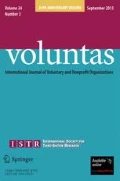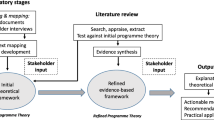Abstract
Neither on the level of interactions between organizations nor on the level of servicing users, co-production has a fixed meaning. It is argued that there are different meanings that unfold once one looks at the impact of narratives such as consumerism, managerialism, or participatory governance. Altogether with the traditions of state-welfare, they simultaneously influence the modes and meanings of co-production in personal services. Taking up the example of modern healthcare systems and its hallmarks in Germany, it is shown that, therefore, uncertainty and ambiguity is the normalcy rather than the exception when it comes to define co-production. Role-expectations such as the “expert–patient” or the “citizen–consumer” have a liberating potential, but may likewise marginalize issues such as trust and the need for protection. User organizations are well challenged beyond their role of helping users to cope as good as possible with given role models of co-production.
Résumé
La co-production n’a de signification fixe ni au niveau des interactions entre organisations, ni à celui des services fournis aux usagers. On a avancé que différentes significations se font jour lorsqu’on examine l’impact des narratifs inhérents aux notions de consommation, de gestion, ou de gouvernance participative. Combinés avec les traditions de l’Etat-providence, ces narratifs influencent simultanément les modalités et les significations de la co-production dans les services aux personnes. En prenant l’exemple des systèmes modernes de soins et ses caractéristiques en Allemagne, on démontre que l’incertitude et l’ambigüité sont la norme plutôt que l’exception lorsqu’il s’agit de définir la co-production. Les attentes quant à certains rôles-types tels que celui du « patient-expert » ou du « consommateur-citoyen » ont un potentiel libérateur mais peuvent aussi marginaliser des problèmes tels que la confiance ou le besoin de protection. Les organisations d’usagers font face à des défis qui vont bien au-delà de leur role consistant à aider les usagers à s’en sortir du mieux possible étant donnés les rôles-types attachés à la co-production.
Zusammenfassung
Weder im Rahmen der Interaktionen zwischen Organisationen noch bei der Dienstleistungserbringung gegenüber den Empfängern hat der Begriff Co-Produktion eine feststehende Bedeutung. Es wird behauptet, dass sich unterschiedliche Bedeutungen ergeben können, wenn man die Auswirkungen von Vorstellungen, wie beispielsweise Konsumerismus, Managerialismus oder partizipatorische Führung, betrachtet. Zusammen mit den Traditionen eines staatlichen Sozialsystems beeinflussen sie gleichzeitig die Formen und Bedeutungen der Co-Produktion bei persönlichen Dienstleistungen. Anhand des Beispiels moderner Gesundheitssysteme und ihren typischen Merkmalen in Deutschland wird dargelegt, dass bei der Definition der Co-Produktion Unsicherheit und Ambiguität folglich eher die Regel als die Ausnahme darstellen. Rollenerwartungen, wie zum Beispiel in den Fällen „Spezialist-Patient“oder „Bürger-Konsument“, haben ein befreiendes Potenzial, können jedoch gleichzeitig Aspekte wie Vertrauen oder Schutzbedürfnis marginalisieren. Nutzerorganisationen stehen einer großen Herausforderung gegenüber, die weit über ihre Rolle hinausgeht, Nutzer zu unterstützen, sich bei den vorgegebenen Rollenmodellen der Co-Produktion so gut wie möglich zurechtzufinden.
Resumen
Ni en el nivel de las interacciones entre las organizaciones ni en el nivel del servicio a los usuarios, la co-producción tiene un significado fijo. Se sostiene que existen diferentes significados que se revelan una vez que examinamos el impacto de descripciones, tales como el consumismo, el gerencialismo o la gobernanza participativa. Junto con las tradiciones del estado del bienestar, influyen simultáneamente en los modos y significados de la co-producción en los servicios personales. Aceptando el ejemplo de los modernos sistemas de atención sanitaria y sus características distintivas en Alemania, se muestra que, por consiguiente, la incertidumbre y la ambigüedad es la normalidad en lugar de la excepción cuando se trata de definir la co-producción. Las expectativas de roles, tales como el “experto-paciente” o el “ciudadano-consumidor” tienen un potencial liberador pero pueden marginar asimismo cuestiones tales como la confianza y la necesidad de protección. Las organizaciones de usuarios se ven desafiadas más allá de su papel de ayudar a los usuarios a hacer frente lo mejor posible a los modelos de rol de co-producción dados.
摘要
无论从机构之间的交流水平,还是服务用户的水平来看,合作生产都具有固定的含义。据称,当我们研究消费主义、管理主义或参与式治理等学说的影响时候,会出现若干种不同的含义。与国家福利的传统一道,它们同时影响了个人服务业合作生产的方式和含义。以现代医疗体系和德国的医疗体系特点为例,我们会发现,在定义合作生产时,不确定性和模糊性是常态,而非例外情形。比如“专家-病人”或“公民-消费者”的角色预期具有带来自由的潜能,但同样也可能会使诸如信任和保护需求等问题边缘化。用户组织的角色是帮助用户尽可能处理好合作生产的既定角色模型,而如今用户组织面临的挑战已经不局限于它的原有职责。
ملخص
ليس على مستوى التفاعل بين المنظمات ولا على مستوى تقديم الخدمات للمستخدمين، الإنتاج المشترك له معنى ثابت. ثمة من يقول أن هناك معاني مختلفة التي تتكشف عندما ينظر أحد إلى تأثير السرد مثل إنشغال المجتمع بتملك السلع الإستهلاكية، الإعتماد على مديرين فنيين في الإدارة أوالحكم المشترك. كل ذلك مع تقاليد حالة الرفاهية يؤثر في نفس الوقت على طرق ومعاني الإنتاج المشترك في مجال الخدمات الشخصية. تناول مثال نظم الرعاية الصحية الحديثة والسمات المميزة في ألمانيا، يبين أن من أجل هذا، عدم اليقين والغموض هو الحياة الطبيعية وليس الاستثناء عندما يتعلق الأمر بتحديد الإنتاج المشترك. توقعات الأدوار مثل “الخبراء- المريض” أو “المواطن- المستهلك” لديه إمكانية التحرير ولكن قد تهمش القضايا مثل الثقة والحاجة للحماية. يتم تحدي منظمات المستخدمين تحدي جيد خارج دورهم في مساعدة المستخدمين على التعامل الجيد كما هو ممكن مع نماذج معينة من الإنتاج المشترك.
Similar content being viewed by others
Notes
This article is based on a chapter previously published in Pestoff and co-workers (2012). New Public Governance, the Third Sector and Co-Production, Routledge, London/New York.
References
Alford, J. (2002). Defining the client in the public sector: A social-exchange perspective. Public Management Review, 7(2), 226–245.
Alford, J. (2009). Engaging public sector clients. From service delivery to co-production. London: Macmillian Palgrave.
Brandsen, T., & Pestoff, V. (2006). Co-production, the third sector and the delivery of public services: An introduction. Public Management Review, 8(4), 493–501.
Brandsen, T., Van de Donk, W., & Putters, K. (2005). Griffins or chameleons? Hybridity as a permanent and inevitable characteristic of the third sector. International Journal of Public Administration, 28(9–10), 749–766.
Clarke, J., Newman, J., Smith, N., Vidler, E., & Westmarland, L. (2007). Creating citizen–consumers: Changing relationships and changing public services. London: Sage.
Evers, A. (2008). Investiv und aktivierend oder ökonomistisch und bevormundend? Zur Auseinandersetzung mit einer neuen Generation von Sozialpolitiken. In A. Evers & R. G. Heinze (Eds.), Sozialpolitik. Ökonomisierung und Entgrenzung (pp. 229–252). Wiesbaden: VS Verlag für Sozialwissenschaften.
Evers, A. (2009). Civicness and civility: Their meanings for social services. Voluntas, Special Issue: Civicness and the Third Sector, 20(3), 239–259.
Evers, A., & Ewert, B. (2010). Hybride Organisationen im Bereich sozialer Dienste. Ein Konzept, sein Hintergrund und seine Implikationen. In T. Klatetzki (Ed.), Soziale Dienstleistungsorganisationen (pp. 103–128). Wiesbaden: VS Verlag für Sozialwissenschaften.
Ewert, B. (2009). Economization and marketization in the german healthcare system: How Do users respond? German Policy Studies, 5(1), 21–44.
Felt, U., Bister, M. D., Strassnig, M., & Wagner, U. (2009). Refusing the information paradigm: Informed consent. Medical research, and patient participation. Health: An Interdisciplinary Journal for the Social Study of Health, Illness and Medicine, 13(1), 87–106.
Kremer, M., & Tonkens, E. (2006). Clients as citizens and consumers—What are the implications for professionals? In J. W. Duyvendak, T. Knijn, & M. Kremer (Eds.), Policy, people and new professionals (pp. 122–136). Amsterdam: Amsterdam University Press.
Kuhlmann, E. (2006). Modernizing health care. Bristol: Policy Press.
Needham, C. (2008). Realising the potential of co-production: Negotiating improvements in public services. Journal of Social Policy and Society, 7(2), 221–231.
Pestoff, V., Osborne, S. P., & Brandsen, T. (2006). Patterns of co-production in public services: Some concluding thoughts. Public Management Review, 8(4), 591–596.
Sennett, R. (2003). Respect in a world of inequality. New York: Norton and Company.
Stehr, N. (1994). Knowledge societies. London: Sage.
Taylor-Gooby, P. (2009). Reframing social citizenship. New York: Oxford University Press.
Verschuere, B., Brandsen, T., & Pestoff, V. (2012). Co-production: The state of the art in research and the future agenda. Voluntas, 23(4), 1083–1101.
Author information
Authors and Affiliations
Corresponding author
Rights and permissions
About this article
Cite this article
Ewert, B., Evers, A. An Ambiguous Concept: On the Meanings of Co-production for Health Care Users and User Organizations?. Voluntas 25, 425–442 (2014). https://doi.org/10.1007/s11266-012-9345-2
Published:
Issue Date:
DOI: https://doi.org/10.1007/s11266-012-9345-2




